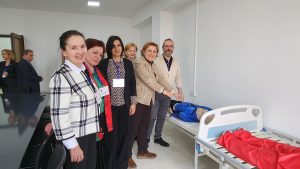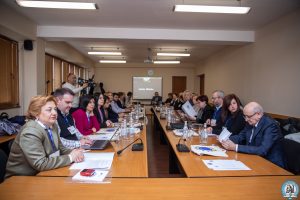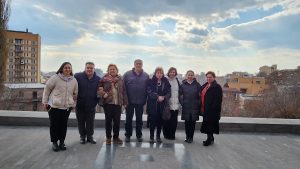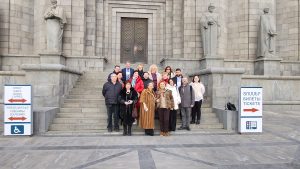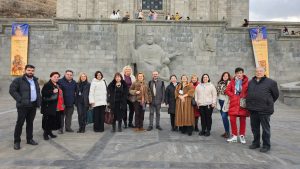SAFEMED+
Online OSCE and Editorial Board Training Course Report
Speakers:
Sergio Cinza, MD PhD. Assistant Professor of Medicine, University of Santiago de Compostela
Víctor M. Arce, M.D. PhD. Full Professor of Medical Physiology, University of Santiago de Compostela, Vaiva Hendrixson, Vice Dean, Professor at Vilnius University
Date: 22.02.2023-24.02.2023
Place: Yerevan State Medical University (YSMU), Yeravan Haybusak University (YHU), Yerevan, Armenia
Participants: Academic and Administrative Staff from the following universities: TMA, USC, TSMU, YSMU, YHU, BSMU, TNMU, Vilnius University, University of Catania.
The training course was conducted within the framework of the SAFEMED+ project of the Erasmus+ program aimed at facilitating the processes of the development and improvement of online OSCE exams in partner universities. A very good opportunity was also created to meet the Editorial Board of the planned book and to discuss in detail the content of the book and clinical cases to be published. The main goal of the training was to discuss the features of organizing, conducting and evaluating the online exam. And the Editorial Board of the book was directed to the discussion and structural integration of clinical cases presented by all participating universities.
During the first day of the training (Facilitators: Ani Rapyan, Nataliia Petrenko) after warm welcome speeches delivered by the YSMU Vice-Rectors Prof. Larisa Avetisyan, Dr. Yervand Sahakyan, Armenian Coordinator of SAFEMED+ project Anna Ghazaryan, Head of the National Erasmus+ Office in Armenia Lana Karlova and Project Coordinator Prof. Ia Avaliani, trainers started to talk about online OSCE examination. During the first half of a day they covered topics about structures of online OSCE scenarios. Dr. Arce and Dr. Cinza shared their experience of organizing online OSCE examination, their thoughts about responsibilities and requirements for the online OSCE coordinator, academic committee, authoring committee, circuit coordinator, examiners, administrative support. Some issues on writing clinical situations and stations were also discussed. Speakers’ presentations also touched upon topics concerning scoring, assessment and checklists.
The participants learned how to write a technical report for cases, how to design the station, how to evaluate.
After lunch break the Editorial Board began discussing the content of the planned book and clinical scenarios presented by the participating universities. The discussion was moderated by Vaiva Hendrixson. Structural unification of all scenarios and also structure of stations and evaluation forms were of key importance. The example was based on discussing Migraine pathology scenario from the USC.
The second day of the training was held in Yerevan “Haybusak” University. During the first part of the day Dr. Sergio Cinza and Prof. Victor Arce shared their experience in writing scenarios for computer-based OSCE. Technical aspect of designing cases was also discussed based on the experience of the Spanish speakers on the “Moodle” platform.
The second part of the day was dedicated to the meeting of financial departments of the universities. Future expenses were planned and financial specialists of TMA gave recommendations on cost management.
Later participants visited Simulation Center of YHU where the equipment purchased within the SAFEMED+ project was presented.
During the third day of the training (Facilitators: Aram Hayrapetyan, Akaki Sepashvili) colleagues from Vilnius University and USC presented their information about the preface and content of the book. The Editorial Board then proceeded with the discussion of clinical cases presented by the participating universities.
After lunch break all participants visited the YSMU Simulation Center where they got acquainted with the activities of the center, the basic principles of training courses, simulators, including new simulators purchased within the SAFEMED+ project.
The trainings were summarized by Prof. Ia Avaliani with some comments on the upcoming steps and meetings in SAFEMED+ and with words of appreciation towards the host university, organizers and trainers.
All materials of the training, including PPTs, checklists, cases are shared with the participating universities and are accessible to wide academic communities.
During all days of the training online broadcast via zoom link was available to the universities’ staffs.
